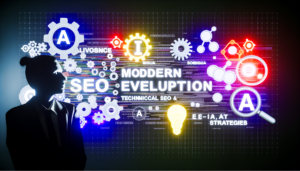The Role of Artificial Intelligence in Modern SEO Strategies
Search Engine Optimization (SEO) has evolved dramatically with the integration of **artificial intelligence (AI)**. Once reliant on manual keyword stuffing and guesswork, modern SEO now leverages AI to analyze vast datasets, predict user behavior, and optimize content with surgical precision. This shift has transformed how businesses approach search rankings, user engagement, and content relevance. In this article, we explore how AI tools and algorithms are reshaping SEO practices, from automating mundane tasks to enhancing personalized user experiences. By understanding the synergy between AI and SEO, marketers can future-proof their strategies and stay ahead in an increasingly competitive digital landscape.
Automating Routine Tasks and Data Analysis
AI excels at handling repetitive tasks that once consumed hours of human effort. Tools like **natural language processing (NLP)** and machine learning algorithms now automate keyword research, meta tag optimization, and backlink analysis. For example, platforms such as BrightEdge and MarketMuse use AI to identify content gaps and recommend semantically related keywords. By processing millions of search queries in real time, AI uncovers patterns humans might miss, such as emerging trends or shifts in user intent. This automation not only speeds up workflows but also ensures data-driven decisions, reducing reliance on trial-and-error tactics.
Enhancing Content Relevance with AI-Driven Insights
Content quality remains a cornerstone of SEO, but AI redefines what “quality” means. Advanced algorithms like **BERT** and **GPT-4** analyze top-ranking content to determine what resonates with users. They evaluate factors like readability, contextual relevance, and semantic coherence, offering actionable feedback to writers. For instance, AI can suggest subtopics to improve depth or flag keyword overuse that might trigger spam filters. Additionally, tools like Clearscope and SurferSEO provide real-time content grading, aligning drafts with SEO best practices. This ensures content satisfies both search engine crawlers and human readers, balancing technical optimization with engaging storytelling.
Personalizing User Experiences at Scale
Modern users expect tailored experiences, and AI makes personalization feasible for businesses of all sizes. By analyzing user data—such as browsing history, location, and device type—AI crafts dynamic content that adapts to individual preferences. For example, e-commerce sites use AI to display personalized product recommendations, boosting dwell time and reducing bounce rates. Chatbots powered by NLP handle customer queries 24/7, improving engagement while collecting valuable data for SEO. This level of personalization not only enhances user satisfaction but also signals to search engines that a site offers value, indirectly boosting rankings through improved metrics like click-through rates (CTR) and session duration.
Predicting Algorithm Updates and Mitigating Risks
Search engine algorithms evolve constantly, but AI helps marketers stay ahead of the curve. Predictive analytics models, trained on historical data, forecast potential algorithm changes and their impact. Tools like SEMrush’s Sensor algorithm volatility tracker use AI to alert users to ranking fluctuations, enabling proactive adjustments. Moreover, AI identifies vulnerabilities—such as thin content or toxic backlinks—before they trigger penalties. For example, deep learning models can simulate how Google’s crawlers interpret page structure, highlighting technical SEO issues. By anticipating shifts and addressing risks early, businesses minimize disruptions and maintain consistent visibility in search results.
Conclusion
Artificial intelligence has irrevocably transformed SEO, turning it into a blend of data science and creativity. From automating keyword research to personalizing user journeys, AI tools empower marketers to optimize efficiently and at scale. However, human oversight remains critical. While AI identifies patterns and predicts trends, marketers must interpret these insights ethically and strategically. The future of SEO lies in harmonizing AI’s analytical power with human intuition—crafting content that resonates emotionally while adhering to technical best practices. By embracing this synergy, businesses can navigate algorithmic complexities, deliver unmatched user experiences, and secure long-term success in the digital arena.


